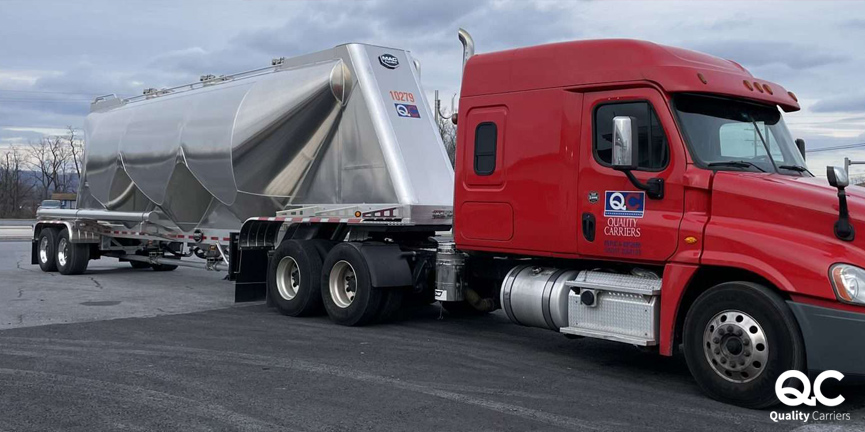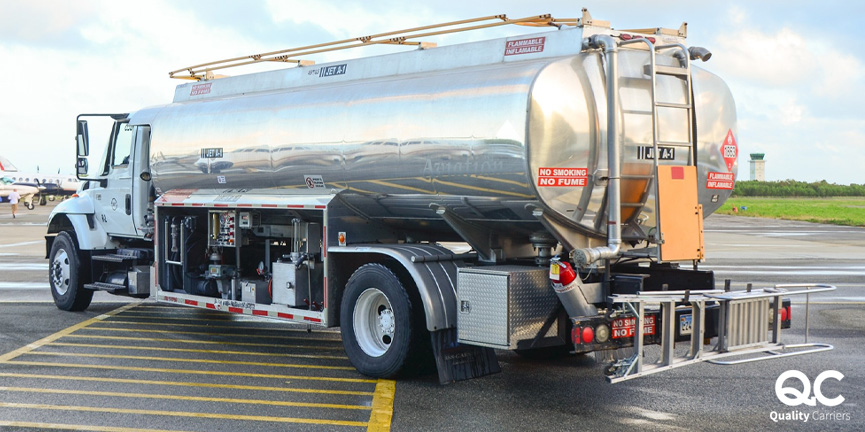Chemicals are fundamental to numerous industries, but their transportation requires utmost care and precision. This is where chemical transport and trailer equipment play a crucial role. The safe and efficient transport of chemicals is vital to protect human health and the environment and maintain regulatory compliance.
In this blog, we will delve into the significance of chemical trailers and explore the importance of reliable transport equipment in ensuring chemical secure and responsible transportation. From safety and regulatory compliance to contamination prevention and logistical efficiency, we will highlight the key aspects that make chemical trailers and transport equipment indispensable in the chemical transport industry.
Chemical Transportation Basics
Transporting chemicals requires specialized equipment to ensure safe and efficient delivery. Three standard methods are used in chemical transportation: liquid bulk tanks, dry bulk trailers, and totes within a dry van.
Liquid Bulk Tanks
Liquid bulk tanks are specifically designed to transport large quantities of liquid chemicals. These tanks are constructed with materials compatible with the transported chemicals, such as stainless steel or aluminum. They often feature safety mechanisms, such as pressure relief valves and containment systems, to prevent leaks or spills. Liquid bulk tanks are commonly used for transporting liquids like chemicals, petroleum products, and food-grade substances. Their capacity can vary depending on the tank’s size and the cargo’s specific requirements.
Dry Bulk Trailers
Dry bulk trailers transport dry, granular, or powdered chemicals in bulk quantities. These trailers are designed with compartments or hoppers that allow for easy loading and unloading of the cargo. Dry bulk trailers can transport various dry chemicals, including fertilizers, grains, plastics, and minerals. They are equipped with specialized discharge systems, such as pneumatic or gravity-fed mechanisms, to offload the dry cargo efficiently. Dry bulk trailers come in various sizes and configurations to accommodate cargo volumes and handling requirements.
Totes within a Dry Van
Totes, also known as intermediate bulk containers (IBCs), are portable containers typically used within a dry van for transporting smaller quantities of liquid or granular chemicals. These containers are often made of plastic or composite materials and feature a rigid structure with integrated pallets for easy handling. Totes can be stacked to optimize space utilization within a dry van. They are commonly used for transporting chemicals in intermediate quantities, providing a convenient and cost-effective solution for smaller-scale shipments.

Chemical Transport Equipment Considerations
Transporting chemicals requires careful consideration and adherence to specific guidelines to ensure safety, regulatory compliance, and preparedness for unforeseen events.
Safely Transport Chemicals
Ensuring the safe transport of chemicals is paramount to protecting human health, the environment, and property. It involves selecting appropriate chemical transport equipment designed and equipped to handle the specific properties and hazards of the transported chemicals. This includes choosing tanks, trailers, or containers compatible with the chemical’s characteristics, utilizing proper labeling and markings, securing the cargo to prevent leaks or spills, and following established handling and loading procedures.
Understand and Follow State and Route-Specific Regulations
Chemical transport is subject to various regulations and guidelines imposed by state, federal, and international authorities. Understanding and complying with these regulations is crucial, which can vary depending on the specific chemical being transported and the routes involved. This includes obtaining the necessary permits, licenses, and certifications, adhering to precise handling and storage requirements, and following protocols for emergency response and reporting incidents. Staying up-to-date with evolving regulations helps maintain compliance and ensures the safe and legal transport of chemicals.
Preparedness for Natural Disasters
Chemical transporters must also consider the potential impact of natural disasters on their operations. Natural disasters, such as hurricanes, earthquakes, floods, or wildfires, can disrupt transportation infrastructure, damage equipment, and pose significant safety risks. It is essential to have comprehensive contingency plans to mitigate these risks. This includes developing emergency response protocols, establishing communication channels with relevant authorities and stakeholders, implementing proper storage and containment measures to prevent environmental contamination in case of spills, and having alternative routes or transportation options identified to minimize disruptions during disasters.

Advantages of Using Chemical Trailers and Chemical Transport Equipment
- Safety and Compliance – Chemical trailers and transport equipment are designed and constructed to meet stringent safety standards and regulatory requirements. They incorporate safety features such as pressure relief valves, emergency shut-off systems, and protective enclosures to ensure the secure containment and transport of hazardous chemicals. By using specialized equipment, transporters can maintain compliance with safety regulations and minimize the risk of accidents or spills.
- Efficient and Cost-Effective – Chemical trailers and transport equipment are designed for efficiency, allowing for optimized use of transportation resources. They maximize cargo capacity, ensuring more chemicals can be transported in a single trip, reducing transportation costs. Additionally, efficient loading and unloading processes minimize turnaround times and improve overall logistics efficiency.
- Contamination Prevention – Chemical trailers and transport equipment are designed to prevent cross-contamination between different chemicals. They feature separate compartments, dedicated valves, and seals to ensure the integrity and purity of the transported chemicals. This is particularly important for sensitive materials or food-grade chemicals that require stringent quality control.
- Versatility and Compatibility – Chemical trailers and transport equipment are designed to be compatible with various transportation modes, including road, rail, and sea. This versatility allows for seamless transfer between different ways without transloading, saving time and reducing the risk of contamination or product loss during transfer.
- Environmental Considerations – Chemical trailers and transport equipment incorporate environmental considerations into their design. They have features to minimize emissions and prevent leaks or spills that could harm ecosystems. Transporters can use specialized equipment to contribute to sustainable transportation practices and reduce their environmental footprint.
Conclusion
In conclusion, the significance of chemical trailers and transport equipment in the transportation of chemicals cannot be overstated. These specialized equipment ensure the safe and secure transport of hazardous substances while promoting regulatory compliance and preventing contamination. By investing in reliable equipment and adhering to industry best practices, chemical transportation companies can ensure the integrity of their operations, protect human health and the environment, and maintain regulatory compliance. The importance of utilizing proper chemical trailers and transport equipment must be considered in the responsible and efficient transportation of chemicals.
FAQs
Yes, chemical trailers and transport equipment are designed to handle various chemicals, including corrosive liquids, flammable substances, gasses, and food-grade materials. They are constructed with materials and features that ensure compatibility with specific chemical properties and requirements.
Chemical trailers and transport equipment incorporate security measures such as lockable valves, tamper-proof seals, and surveillance systems to safeguard the transported chemicals. These features prevent unauthorized access and ensure the integrity and security of the cargo during transportation.
Chemical trailers and transport equipment have safety features such as pressure relief valves, emergency shut-off systems, and protective enclosures. These features minimize the risk of accidents and spills by controlling pressure, preventing overflows, and providing emergency containment measures.
Yes, specific regulations and standards, such as those set by the International Organization for Standardization (ISO) and local regulatory bodies, govern the design, construction, and use of chemical trailers and transport equipment. Adherence to these regulations ensures that the equipment meets safety requirements and industry standards.
Chemical trailers and transport equipment are designed for efficient loading and unloading processes, minimizing downtime and optimizing logistics operations. Their standardized dimensions and compatibility with different transportation modes enable seamless transfer between trucks, railcars, and ships, streamlining the supply chain and ensuring timely deliveries.







